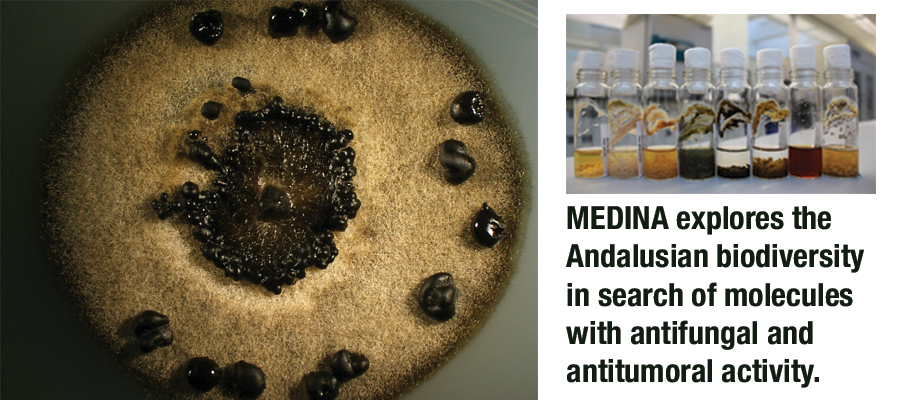PRESS RELEASE
A project that counted with the participation of the Andalusian government, published in Scientific Reports of Nature, analyzed the diversity of fungal endophytes from 63 endemic plants collected in the Desert of Tabernas (Almería) or in Saladar del Margen (Granada), and their application as a source of new antifungal and antitumoral agents.
Granada, 17th of July 2018. Since 2008, the year that Foundation MEDINA, was established in Granada as a Research center in innovative drugs, one of its main objectives has been the exploitation of the Andalusian microbial diversity. Andalusia hosts one of the richest biodiversities in Europe, having more than 30% of its surface protected as nature reserve. “We have worked diligently, attempting to isolate and identify as many microorganisms as possible, mostly bacteria and filamentous fungi, and maintaining our focus on the generation of molecules with therapeutics applications”, points out Olga Genilloud, scientific director of the institution.
The widely diverse ecosystems present in the region have created a large diversity of endemic plants with more than 550 different species registered. In this context, through a research project of excellence founded by the Andalusian government, MEDINA has conducted a study on fungal endophytes isolated from endemic plants from arid and semi-arid Andalusian areas. “The idea was to make an optimized use of the biodiversity of those fungi able to survive in plants that have adapted themselves to the extreme environment of the desert of Tabernas (Almería) or the Saladar del Margen (Granada), in order to identify their antifungal or antitumoral capacity”, explains Víctor González, researcher at MEDINA.
During this study, recently published in Scientific Reports, with the help and collaboration of botanists from the University of Granada, the team of researchers travelled to different areas where the vegetation is well adapted to the conditions of salinity, sunstroke and extreme heat. “Some really rare specimens, only found in these specific points of Andalucía, were collected”, adds González.
According to this researcher, MEDINA carried out the isolation, identification and characterization of more than fungal 350 strains from these healthy plants. “Once this process was accomplished, expression of the chemical diversity of these strains was estimulated through diverse fermentation techniques, allowing the production of secondary metabolites whose antifungal and antitumoral properties were evaluated“, González added.
The next step of the research, he tells, “was to test this collection of strains against human pathogens with clinic applications and to study its potential antiproliferative activity against tumoral cells. A second line of investigation also analyzed the same extracts against plant pathogens, to check the hypothetical protection these microorganisms may confer to plants.
The expert finally concluded “the diversity of Andalusian plants brought a large quantity of fungal endophytes with the capacity to generate a large variety of molecules with a high potential antifungal activity. Furthermore, we were able to isolate and purify 3 new molecules with antitumoral activity.”
One of the biggest collection of the world
“In search of new molecules with medical applications, Foundation MEDINA is still making use of the biodiversity of one of the biggest collection of microorganisms issued from a large representation of ecosystems”, adds Genilloud. She also pointed out this recent investigation in endemic plants from Andalusia was the opportunity to add new strains to the more than 190.000 microbial strains collection owned by MEDINA.
“We are continuously attempting to sample barely explored ecological niches such as endemic plants or marine and extreme environments, seeking for a wider diversity of microorganisms from which new molecules with therapeutics applications can be identified.” said Genilloud.





